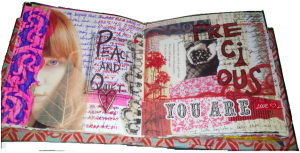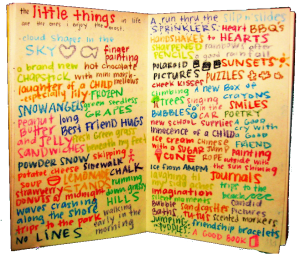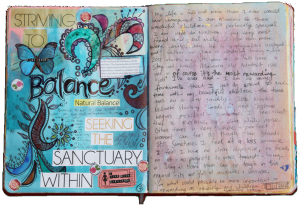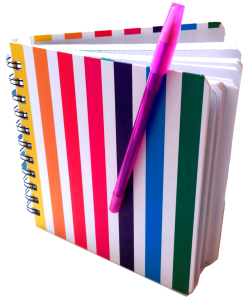Journaling has played a significant role in my life and recovery journey.  From a young age, I began to process and record events, thoughts, feelings, challenges and joys through ‘stream-of-consciousness’ writing (recording my thoughts and feelings in a continuous and uninterrupted flow); poetry; song-writing; and visual arts (from scribbles to more elaborate artworks). When overwhelmed with emotion or a continuous stream of intrusive thoughts, projecting them onto paper has helped to clarify my feelings and thoughts; slow these processes down; cope more effectively with them; gain greater insight into myself; and allowed me to problem solve more effectively. My journal travels everywhere with me and I take every opportunity I can (in doctor’s waiting rooms, on the bus, after lunch, etc) to reflect and record.
From a young age, I began to process and record events, thoughts, feelings, challenges and joys through ‘stream-of-consciousness’ writing (recording my thoughts and feelings in a continuous and uninterrupted flow); poetry; song-writing; and visual arts (from scribbles to more elaborate artworks). When overwhelmed with emotion or a continuous stream of intrusive thoughts, projecting them onto paper has helped to clarify my feelings and thoughts; slow these processes down; cope more effectively with them; gain greater insight into myself; and allowed me to problem solve more effectively. My journal travels everywhere with me and I take every opportunity I can (in doctor’s waiting rooms, on the bus, after lunch, etc) to reflect and record.
What is Journaling?
Journaling is a private way for me to record my ideas, feelings, frustrations, significant events, challenges, and successes. Moon (2004:188) calls it “cognitive housekeeping” to imply its nature as a sorting out, clarifying process. It is also a process of self-evaluation, self-analysis, self-recall, self-observation, and self-dialogue (Yip 2006).
Why Journal?
Journaling helps to (Purcell 2006):
- Clarify my thoughts and feelings – Do you ever seem all jumbled up inside, unsure of what you want or feel? Taking a few minutes to jot down my thoughts and emotions (no editing!) will quickly get me in touch with my internal world.
 Know myself better – By writing routinely I get to know what makes me feel happy and confident. I also become clearer about situations and people who are toxic for me — important information for my emotional well-being.
Know myself better – By writing routinely I get to know what makes me feel happy and confident. I also become clearer about situations and people who are toxic for me — important information for my emotional well-being.- Reduce stress – Writing about anger, sadness and other painful emotions helps to release the intensity of these feelings. By doing so, I feel calmer and better able to stay in the present.
- Solve problems more effectively – Typically I problem solve from a left-brained, analytical perspective. But sometimes the answer can only be found by engaging right-brained creativity and intuition. Writing unlocks these other capabilities, and affords the opportunity for unexpected solutions to seemingly unsolvable problems.
- Resolve disagreements with others – Writing about misunderstandings rather than stewing over them helps me to understand another’s point of view. And I just may come up with a sensible resolution to the conflict.
- Track patterns, trends, improvement and growth over time – When current circumstances appear insurmountable, I am able to look back on previous dilemmas that I have since resolved.
How do I go about Journaling?
 Whatever the form of writing used, the objective is not to produce a literary work of art. Far more important than that is the emotional expression lying beneath the words, irrespective of written style or content. When I write, I try not to be concerned about stylistic aspects, such as neatness, grammar, spelling and punctuation. What I write is for my eyes only, so it is not necessary for it to be decipherable by anyone but me. I try to write spontaneously as I think. Thoughts may come in random order and themes may not be connected. This is the way some thinking happens privately, so I try not to change it or put it into a ‘sanitised’ form. I try to resist the urge to make it look nice or read well. I need to let my writing flow with my thoughts and learn to live with any disordered writing mess which may arise.
Whatever the form of writing used, the objective is not to produce a literary work of art. Far more important than that is the emotional expression lying beneath the words, irrespective of written style or content. When I write, I try not to be concerned about stylistic aspects, such as neatness, grammar, spelling and punctuation. What I write is for my eyes only, so it is not necessary for it to be decipherable by anyone but me. I try to write spontaneously as I think. Thoughts may come in random order and themes may not be connected. This is the way some thinking happens privately, so I try not to change it or put it into a ‘sanitised’ form. I try to resist the urge to make it look nice or read well. I need to let my writing flow with my thoughts and learn to live with any disordered writing mess which may arise.
 There is a journal included in the hard copy of the Recovery Resources Package to get you started. I have intentionally selected a journal that contains no lines so that you are not constricted by them and are free to write/draw/express yourself in a non-linear way if that is what supports you. I personally prefer to journal on lined paper, but have found that creative expression (though often confrontational to my perfectionistic tendencies), has been incredibly freeing and often preceded profound insight.
There is a journal included in the hard copy of the Recovery Resources Package to get you started. I have intentionally selected a journal that contains no lines so that you are not constricted by them and are free to write/draw/express yourself in a non-linear way if that is what supports you. I personally prefer to journal on lined paper, but have found that creative expression (though often confrontational to my perfectionistic tendencies), has been incredibly freeing and often preceded profound insight.
All the best as you begin or continue to record and journal your recovery journey.
References
◊ Purcell, M. (2006). The Health Benefits of Journaling. Psych Central. Retrieved on September 5, 2013, from http://psychcentral.com/lib/the-health-benefits-of-journaling/000721
◊ Moon, J. A. (2004). A handbook of reflective and experiential learning: Theory andpractice. Oxon, UK: Routledge Falmer.
◊ Yip, K. (2006). Self-reflection in reflective practice: A note of caution. British Journal of Social Work, 36, 777-788.